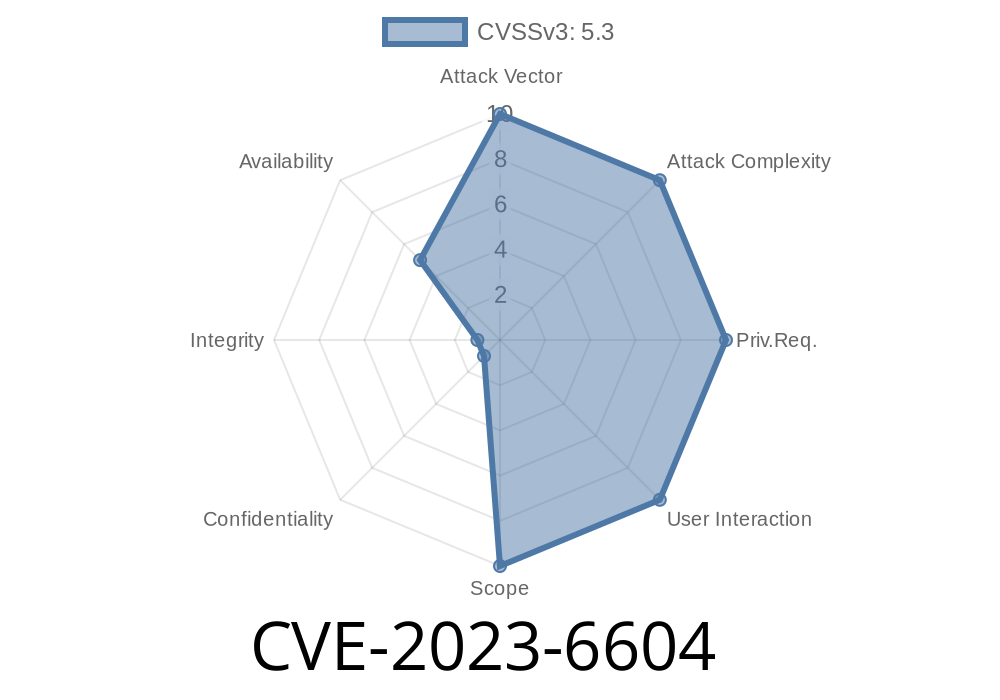FFmpeg is a really popular open-source project, powering most of the world’s multimedia conversion and playback. If you’ve ever converted a video or an audio file, chances are you used FFmpeg in the background—even without knowing it. But recently, in December 2023, security researchers found a major vulnerability in how FFmpeg handles a rare file format called XBIN. This is *CVE-2023-6604*.
Let’s break down what happened, show you how it works, and talk about the risks. I'll use simple language and step-by-step explanations so anyone can understand—not just elite hackers.
What is CVE-2023-6604 All About?
A flaw was found in FFmpeg's XBIN demuxer. The XBIN demuxer is responsible for reading files in the XBIN format, sometimes used for ASCII art and other old-school content.
The bug? FFmpeg wasn’t properly checking if data actually *was* a valid XBIN file—all it took was to throw *any* garbage data at it, and FFmpeg would try to process it, eating up CPU and disk space. This could let an attacker make your computer (or web service, or streaming server) slow down, crash, or burn through system resources.
How Does It Happen? (With Code!)
When you hand data to FFmpeg—say, via a script, or a file upload—FFmpeg checks the input to guess what format it is, then picks a “demuxer” (such as the XBIN parser). The XBIN demuxer *should* check carefully if the file is really XBIN, and only then try to process it.
Here’s a simplified look at the buggy code (from FFmpeg’s demuxer)
// In libavformat/xbin.c, old version
static int xbin_read_header(AVFormatContext *s)
{
// ...snip...
// No proper format validation!
// FFmpeg just charges ahead and starts parsing
// Reads data and expects XBIN fields, regardless
// of whether the data is actually XBIN formatted.
// This leads to excessive processing if it's random data
// ...snip...
}
FFmpeg wasn’t validating that the input file actually had an XBIN header, just calling the parser directly.
What’s the Real Attack Scenario?
Suppose you’re running a web application and accept uploaded videos or images from users. If you use FFmpeg to check each upload (very common!), a sneaky user can upload a file that’s filled with trash data—but named with just the right thing so FFmpeg runs it through the XBIN demuxer.
FFmpeg will try to parse, chewing through lots of CPU and disk while doing it, and potentially slowing down or crashing your service.
Here’s a proof-of-concept script in Python that creates a fake file to trigger the bug
# Make a junk file that will confuse FFmpeg's XBIN handler
with open('attack_file.xbin', 'wb') as f:
# Write random data, not actually XBIN
f.write(b'A' * 100000000) # 100 MB of fake data
Now, process it with FFmpeg
ffmpeg -i attack_file.xbin out.mp4
What happens?
- Older FFmpeg versions will *try to parse the entire file*, burning CPU/disk cycles
Sometimes, your process will hang or eat huge resources
Imagine dozens or hundreds of these uploads: your server might stop responding altogether!
Developers patched FFmpeg to properly check the XBIN header before parsing
// Now FFmpeg does this:
if (header[] != 'X' || header[1] != 'B' || header[2] != 'I' || header[3] != 'N') {
// Not actually XBIN, bail out early
return AVERROR_INVALIDDATA;
}
This fix ensures that only real XBIN files ever get parsed, dramatically reducing the attack surface.
If you use FFmpeg, upgrade to 4.4.4, 5.1.4, 6..1 or later, depending on your branch.
Download: FFmpeg.org Download Page
Filter Inputs:
If you must use older versions, block or validate uploads before handing them to FFmpeg. Only accept known, safe file types.
Links and References
- FFmpeg Security Advisory for CVE-2023-6604
- Patch for the XBIN Validation Bug
- XBIN Format Description (Multimedia.cx Wiki)
- FFmpeg Official Website
Summary
CVE-2023-6604 is a reminder that attackers don’t need to find “remote code execution” bugs—sometimes, resource abuse is enough to take down a system. If you run FFmpeg on untrusted user input, update NOW and double-check your input validation. Little bugs in rare format handlers can have big impacts!
Timeline
Published on: 01/06/2025 17:15:14 UTC
